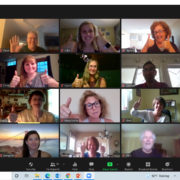CASA Graduates 41 New Advocates
In April and June, CASA of NH held two more sessions of very successful virtual training. As it is in the in-person classroom, virtual training is interactive and collaborative. It requires large and small group participation, welcomes guest speakers, facilitates a virtual role play, includes drafting a sample court report, and provides all of the necessary preparation to start providing effective advocacy for children who’ve experienced abuse and neglect.
Virtual training is proving to be incredibly helpful in providing consistent training opportunities for interested volunteers throughout the state. While there are plans to resume in-person training in 2022, virtual training will remain in place as an effective tool for widespread outreach.
One of the training team’s favorite activities to do during in-person training was to have participants write an uplifting and positive message to their future CASA children. Now in virtual training, they have each participant go around the classroom one-by-one to say their messages. Check out the messages from the participants of our April training below.
Please help us welcome April graduates Jennifer, John, Suzanne, Robin, Sandy, Emily, Greg, Jennifer, Renee, Michelle, Maura, Meghan, Amy, Rachel, Christopher, Amber, Nan, Dolly, Amber, Beth, Erin, Jim and Crystal. We also had our summer intern from the legal department complete training.
The June class faced a weather-related challenge when they went to record their uplifting messages. A thunderstorm rolled through the state at that time, causing a few people experience some technical difficulties! While they were unable to record their messages, they did manage to get a group photo.

Please help us welcome Carol, Allison, Mandy, Diane, MaryLouise, Kali, Roberta, Sheila, Cheryl, Joy, David, Nancy, Cyndi, Kaleigh, Lillie, Sheila, Jennifer and Conrad. We also had three staff members complete training.
Training available this fall
CASA is accepting applicants for future virtual training sessions beginning Sept. 13 and Nov. 1. Interested volunteers can submit their applications today, or, join an upcoming virtual information session to learn more about the role of the CASA volunteer advocate and get specific questions answered. Register for one here.



 After Seacoast New Hampshire resident Dean Plager retired, he enjoyed spending more time sailing, but he also felt a need to give back to society. He read an article about a local woman who was advocating for abused and neglected children as a volunteer with CASA of NH. “It hit home for me because I had been looking for something to do that really makes a difference. This was it,” Dean says.
After Seacoast New Hampshire resident Dean Plager retired, he enjoyed spending more time sailing, but he also felt a need to give back to society. He read an article about a local woman who was advocating for abused and neglected children as a volunteer with CASA of NH. “It hit home for me because I had been looking for something to do that really makes a difference. This was it,” Dean says. Name: Jennifer Adams
Name: Jennifer Adams Name:
Name: Name:
Name: